Editor's Note
Dear Blade Runner Fans:
Before the interview begins, I thought it important to say something about what led to this interview.
William Sanderson, or Bill as he is affectionately called by his wife
and all of us at BladeZone, is an extra-ordinary actor, holder of a Ph.D. in law,
veteran combat medic, fan of Elvis Presley,
friend to my daughter and the rest of us saps at BladeZone and is the devoted and
loving husband of the wonderful Sharon Sanderson.
Yes. That is correct. He is all that and so very much more.
One night back in march of 2000, Bill and Sharon Sanderson joined my
wife Traci, daughter Zoe, our friend Mike Fritz (BladeZone's Prop Editor),
and myself at the dinner table at the Sheraton in Tacoma.
It was there that I saw the truest
and most gentle side of Bill when he asked to feed my daughter Zoe.
Whom by the way fell in love with the guy.
Let me tell you now that JF Sebastion has nothing on Bill Sanderson
when it comes to gentle nature.

The BladeZone staff with William Sanderson in Tacoma
|
The next day the BladeZone staff got to spend the entire morning and
afternoon with the Sandersons at the Millennium Expo.
All I can say is, Bill touched all of us that day with his kind and
gentle way of dealing with everything that came his way.
When he took the stage and spoke about his career and working on Blade Runner,
the room fell silent. It was one of the single most touching appearances on stage
I have ever seen at any convention. At one point, while discussing his kind treatment
by others during his career, his voice cracked. I realized he was fighting back tears.
Then I, along with everyone else around me, found ourselves choked up too.
That just doesn't happen to me. I walked out of the auditorium that afternoon feeling
as though I had been privy to something very special.
Well, after that weekend in Tacoma, I went on holiday for a couple months, leaving BladeZone in the hands of
Nate, Gary and Aaron. They ran the site and club beautifully. better than I could have ever done.
BladeZone is so very lucky to have these guys. Without their constant help and drive, there would not be a BladeZone today.
After my experience at the Millenium Expo, I was prepared to quit completely. But these guys saved my faith.
Last month, after returning from my vacation feeling emotionally fit and ready,
I contacted Sharon and Bill Sanderson and we began planning for the interview.
It now came down to who would have the honor of conducting the interview,
and after a bit of a staff meeting, we came to our final decision.
Without wasting anymore time, I would like say that I hope you enjoy the
following interview with William Sanderson conducted by Aaron Brinkley, BladeZone's News Editor
(and cub reporter). Aaron, like Gary Willoughby, is without a doubt one
of the nicest guys I know and was a perfect choice.
So, once again, I hope you enjoy... I know we certainly did.
Sincerely,
Gerry Kissell
Founder of BladeZone.com
 Aaron Brinkley
Aaron Brinkley
News Editor
www.bladezone.com
|
A Chat With William Sanderson
Interview Conducted & Transcribed by Aaron Brinkley
Edited by Gerry Kissell
Aaron
Brinkley: Mr. Sanderson, I'd like to express how much of a pleasure it
is that you agreed to this interview with BladeZone.
William Sanderson:
Thank you for that. It's a pleasure.
Aaron: I want to go back a few years.
You grew up in and around Memphis in the 1950's. What was that like?
William: Well it was
very exciting because that's where (Elvis) Presley was. Where he
started. And the music was a fabulous inspiration, being able to see
Johnny Cash, Jerry Lee Lewis, Roy Orbison and it just went on and on.
And I also saw the African-American entertainers from Stax Records like
Sam & Dave. I don't think I saw Otis Redding, but I heard him all
the time. So we had that great music and acting was the closest I could
get to it.
Aaron: Not a singer, huh?
William: No. I just
played one, but not a very good one.
Aaron: You served for a while in the
military?
William: Yes. The
Army.
Aaron: Then you went to school to
study law?
William: That's right.
Four years of college, three years of law school.
Aaron: After all that hard work, what
made you want to be an actor?
William: Well, I think
subconsciously I wanted to do it all along. I probably was a coward. I
was very shy. But also I had gone to a great school in high school. And
my friends are lawyers and doctors, one of whom is one of Al Gore's
lawyers. He was one of my closest friends in childhood. I got the G.I.
Bill and at one point, I thought I would be a lawyer. But I never
practiced. I never took the Bar. I went to New York and did theater. But
I always loved movies and had a friend that did theater in high school
and I would go see him, but way too scared to get on the stage.
Aaron: Who had the greatest impact on
your career when you were first studying acting?
William: The first
teacher was in Memphis. The next teacher was in New York. Probably
William Hickey in New York, who happens to have been nominated for an
Academy Award for a movie called "Prizzi's Honor". But in the
movies, it was Presley, and James Dean, Brando, and I liked Charles
Bronson. I did get to work with him later. And Lee Marvin. But to answer
your question, it was probably the teacher, William Hickey. I also liked
my speech teacher in New York, a woman named Marion Rich.
Aaron: Was your goal to stay working
on stage, or had you decided to try film?
William: That's a
great question because Marion Rich told us, "You have to ask
yourself, Can I be happy doing regional theater or do I want to do
something else?." and I told myself that, so I knew eventually I'd
come to California. I loved theater and I just did a play in December,
but it's very tough to make a living at it. And I still think it's the
greatest training. But it definitely didn't take me long to know I
wanted to be in the movies and television. Probably out of vanity.
Aaron: Your big break
came in playing Loretta Lynne's . . . Was it brother or uncle? . . . in
Coal Miner's Daughter.
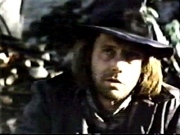
From Coal Miner's Daughter
|
William: Uncle. Thank
you for remembering. Yes, it became a hit and Universal never expected
it to be. And subsequently, I lucked into doing six projects with one of
my favorite actors, Tommy Lee Jones. It was quite a break.
Aaron: Who is William Sanderson at
home? We know your film personas. You are not one of those actors who is
always in the public light after the cameras stop rolling. What are your
hobbies?
William: Well, the
only consistent hobby I've had is studying Spanish and French because of
some delusion of grandeur to work around the world. (laughs) I love
sports but usually I'm looking for the next job.
Aaron: Do you watch much television or
movies?
William: Since I'm in
the Academy, I try to see all the movies, or it wouldn't be fair. And
we're getting ready to vote in the television academy as well. But my
obsession is to make films. It's the process, even though I go through a
lot of anxiety over it, I'm sometimes pleased with the results.
Aaron: Would you eventually like to
produce or direct?
William: Well, I
produced a play in New York called "Hello Out There", and it
led to my first paying job in the theater, but it was a nightmare. And
then my wife, Sharon, produced one out here, an original play called
"Scotch Rocks" and that was the most fascinating experience. I
never saw anybody work as hard as my wife. She kept every actor there. I
understudied all the parts, because in Hollywood, you know, people want
to get big jobs and move on. But all the actors stayed and I think they
respected her. I have gained a new respect for producers. You've got to
be strong, and Sharon is.
Aaron: A lot of fans don't know that
you're a member of the Motion Picture Academy.
William: I consider it
probably one of the biggest honors to be in the Academy. There are only
like 1300 actors in it, and as far as I know, you're a member for life.
To this day, I'm wondering how lucky I was. And I was able to put
another name in, another actor, who got into the Academy. They have to
have two or three people, and Danny Devito and I recommended this other
actor who had great credits. It's just a great, great honor to be in the
Motion Picture Academy.
Aaron: Have you ever been nominated?
William: I've won
awards in voice-overs and stuff like that, but not for an Academy Award.
Aaron: Any early favorites this year?
Maybe Ridley Scott as "Best Director" for Gladiator?
William: Well, not a
bad idea. Not a bad idea at all. It's a little early, but . . . That's a
tough question. I'd have to wait and see. If they send me some cash or
some bribes . . . (both men laugh) No, I'm kidding. That's one of the
things they've tightened up is not taking little presents and stuff. The
people on the board of the Academy have a lot of integrity. And the late
Roddy McDowell, I loved doing an independent horror film with him. I
sometimes think he was on the board and knew who I was. You have to have
a certain number of credits from major films. But then, I've known
people who aren't in the Academy who have some pretty good credits, so
sometimes it's just luck.
Aaron: Does someone in the Academy
have to nominate you?
William: Well, the
board has to approve it, but yeah, members of the Academy do. One of
them was Gailard Sartain, who's in the new movie "The
Replacements". He also did "Mississippi Burning", a lot
of movies. And another actor who has passed away recommended me. We made
some westerns together.
Aaron: As many times as we at
BladeZone have seen Blade Runner , we could never even imagine anyone
else as JF Sebastian. Was there anyone else up for that role?
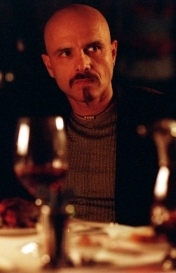
Joe Pantoliano in Matrix
|
William: Nobody ever
asked me that. Back then I didn't even think about it. Now I certainly
do. I don't know of anybody else. Back then I was working one project
after another. I just know it was a pleasure from the time I went in to
the time I met Ridley and talked to him one on one. Ah . . . I do know
another actor who was up for the role, who's doing very well. His name
is Joe Pantoliano. He did "The Fugitive" and a lot of movies.
(Joe Pantoliano also played Cypher in "The Matrix".) Only
because, I don't want to sound like I'm gloating, I just got lucky. Joe
came to me at an interview once and said, "You got my role in Blade
Runner!" He is a wonderful actor. You may not know his name, but
you look him up on the IMDB (Internet Movie DataBase). He's directing his first film, that he wrote, with some great actors.
He's a friend, I like him. Know him from New York many years ago.
Aaron: Did you have to audition for
the part of Sebastian?
William: I don't
recall really auditioning. I'm sure I read it with Ridley. I don't
recall. I had just done "Scared Straight", which is a
documentary which won the Academy Award and then they made a movie of
the week for CBS. And I was thrilled because it was a quite different
part playing a convict, a hardened convict and then a more innocent
character (Sebastian). I was so thrilled they didn't put me through
hoops. They didn't promise you a job you didn't get. Ridley is a bit of
a visionary, you know. I don't think he needs too much time (to decide).
He doesn't use a lot of people more than once. I'd like to work with him
again, that's for sure.
Aaron: Once you secured the part, how
did you prepare to play him?
William: Well, it came
up very quickly. I didn't have much time. I tried to get pictures and
news accounts of people with premature aging. And they had a kid who
went to Disneyland and it was so touching. They showed him on the news
and he walked like his feet were tender. A little boy, but he looked
much, much older. I used his image. I used Einstein's image or tried to.
Not enough research. Not enough. You play chess?
Aaron: Yes.
William: So the next
one I get, I'll ask you to help me. (Aaron laughs) I'm not such a good
chess player. One of the joys about acting is researching. An Academy
Award winning actor called me, thought he had a new movie to direct. We
both loved the book, but it fell through and I'd spent weeks and weeks
studying and learning. Still had fun but it's disappointing. It's a joy
when you know you're going to get a role ahead of time and be able to
research it. On the television series, Newhart, I had played that
character (type) in low-budget films. I had worked on him in theater and
studied this tramp-like figure so I stuck him in an audition. You could
say you're only as good as the time you put in on something.
Aaron: What was Sebastian's
relationship with Tyrell? Obviously it was more than just
employer/employee.
William: Well, I think
he was very intimidated by him. But certainly where Ridley helped me
with his direction was telling me about his children. With the revulsion
that Sebastian feels when he sees the eyes being squeezed, Ridley had
children and he said he tried not to let them watch horror films too
much. But he saw them one time standing outside the doorway peering in
at the television and kind of intrigued and frightened at the same time.
Sebastian was a paranoid person, insecure. But supposedly he was
somewhat innocent. It's the one film I get asked the most about. More
importantly, it's the one that got me the most work.
Aaron: How would you describe
Sebastian's relationship with the Replicants?
William: I think he
was kind of fascinated and I played it as if he loved them. I mean, when
he says to Pris and Roy, "There's some of me in you.". Like
Ridley, I don't sit and watch it. It's hard to watch something you've
done many years ago. Can I tell you what I've never told an interviewer,
one of the most interesting comments?
Aaron: Sure.
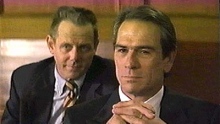
From The Client
|
William: It's not
meant to sound boastful or anything. I was in a bar owned by Carrol
O'Conner and the late Patrick O'Neill. An actor ran up to me and said
"You were great in that movie, 'Blade Runner'." He said,
"You are going to do so well out here, IF they know who you are. IF
they know who it was." And I don't know what that meant. I guess
because I wore makeup (as Sebastian). Another movie which I didn't talk
a lot in was "The Client" and they don't even know it was me.
Blue contact lenses, flat-top. But it wasn't as good a role. But it made
a lot more money. It was with Susan Sarandon, Tommy Lee Jones, and
(author) John Grisham. They're hard to get, hit films.
Aaron: Did you see many changes in the
script as you went on through the shoot?
William: Not too much.
No. Not with my part. I think Rutger liked to tweak things and he's a
great actor and contributed so much, but probably more so in the end of
the film. I generally revere and respect the writers and don't do a lot
of improvising. Sometimes, I learned from Ridley, merely transposing
lines works. But if you want to do the film and read the script, then do
it, but if you want to rewrite something, don't do the film. But I'm not
a director or a writer and everybody works differently.
Aaron: How was is working with Rutger
Hauer?
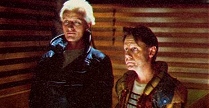
Rutger & Bill
|
William: Not a problem
at all and he's a nice fellow. I've seen him in a restaurant and I'm
very sad that I haven't worked with him again. I think he's a great
actor.
Aaron: It would be great to see you
and Rutger acting together again.
William: Oh, I'd love
it. But I have great respect for him. He speaks five languages.
Aaron: How about Kevin Thompson and
John Edward Allen, who played Sebastian's creations, The Bear and The
Kaiser?

Kevin Thompson & John Edward Allen
|
William: Oh, they were
very sweet. They came from their dressing room and . . . I think now I
would have tried to get to know them better. I have more confidence. But
I kind of stayed in my dressing room and when you go to the set, there's
a freshness there. But I didn't have a lot of contact with them, I just
know that they were never a problem. They were fun, you'd see them in
makeup but rarely did I see them out of makeup.
Aaron: And Daryl Hannah?

Daryl Hannah & Bill
|
William: I think she's
a tribute to the profession. She's a real lady. I treasure these . . . I
have a couple of drawings she made for me, she may have even forgotten,
of her character and mine. And it was not long after we did the movie,
and I pick up LIFE magazine and there she is. She was gracious beyond
her age. She was groomed for greatness. No, he kind of loved her,
Sebastian. And it wasn't hard to be intimidated. (both laugh) Because
she's so beautiful, but she's beautiful inside.
Aaron: Do you have contact much with
anyone from Blade Runner today?
William: No. I used to
run into Brion, bless his heart, a lot because of the interviews.
Another terrific actor. Let's see. Sometimes James Hong. We had worked
not long after (Blade Runner) on a thing by the man that wrote
"Roots", Alex Haley. Eddie Olmos met me on that film (Blade
Runner) and put me in a western which people still mention. And a
reviewer said some nice things (about it) in the L.A. Times. Eddie is a
little bit of a hero to me because he's turned down money and roles that
didn't depict Latinos the way they should be. I never turn down anything
hardly. (laughs) He's a really, really good person.
Aaron: Both the BFI (British Film
Institute) and the AFI (American Film Institute) have Blade Runner
listed in the top 100 most influential films of the century. How did you
feel about Blade Runner while you were working on it? Did you feel it
was going to be something important or was it just another movie at the
time?
William: I felt there
was something special about it because my agent from New York wanted to
come on the set. People I didn't know were acting like they were my
friend to get on the set, one of whom got next to the DP (Director of
Photography) and started asking questions. And people wanting to visit
because of the fascinating set. So I did think it was something special
and also the agents came, my agents came on the set! And when they do
that, there's usually an expectation that it's important. And you listen
to people on the crew that sometimes say things and set you up for
failure. (both laugh) No, they said nice things. But lots of times when
you're younger and newer they'll say "Oh, you're going to be a star
after this.". So they had high hopes for it. But a lesson, like
Ridley may have said, "Stick to your goal, your vision, and time
may prove you right.", you know. And I think Ridley is somewhat
vindicated by his vision.
Aaron: Yeah, I would say so.
William: With the
riots in L.A., subsequently, and certainly a "city on
overload" is what he told me. I believe he told me it was L.A. with
a New York skyline. You have all these different nationalities here and
gridlock on the roads. It's difficult to deal with the traffic in L.A.
and there's a great deal of tension at times, like around Staples Center
right now. (both laugh) (Staples Center was the site of the 2000
Democratic National Convention which was marked by numerous protests and
clashes between demonstrators and police.)
Aaron: Is your wife Sharon a Blade
Runner fan?
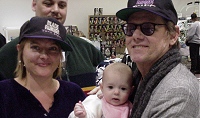
Sharon, Zoe & Bill.
That's Gerry towering behind Sharon.
|
William: She never
raves about anything, you know. We got married after that movie. She
certainly has helped me. And Gerry Kissell and BladeZone have helped us
immensely. We've been invited to a new convention in Hollywood. And the
one in Tacoma (the Millennium Expo) was the first one we did, so I have
to thank you all for keeping it alive. This one's in town so I don't
miss work and I might run into some actors that I haven't seen from the
movie. Joanna Cassidy, who is a lovely lady, and she's supposed to be
there among others.
Aaron: Is it a Blade Runner convention
or just a general science fiction one?
William: This one is
called Cult Movies. So I might be able to see some friends. One of the
things, I went to one, this guy came up to me. He's bringing posters in
there, he's interrupting, he's not supposed to solicit actors. Charlton
Heston was there, line ten times as long as mine. This young man told me
he had a film. And he actually ended up giving us a job and flying us to
Arizona. But you know what I'm saying, I'd rather be in Florence, Italy
with Ridley Scott making "Gladiator" or something. There's a
strike right now. You can't do voice-overs for cartoons, commercials, so
I have to find every means to survive. I'm working right now, but it
won't get me out of debt. (both laugh) No, I'm doing fine. I've made a
very good living and I'm grateful. But the business breeds insecurity.
You're only as good as your next film.
Aaron: How was your relationship with
director Ridley Scott on the set?
William: As far as I
know it was fine, but he hasn't given me another job! (both laugh) I
don't know if he's hired anybody from that movie on another job.
Aaron: Many of the actor's who worked
on Blade Runner have said that there was a lot of pressure involved in
working with Ridley Scott. Did you feel that as well?
William: Not one
instant. But he had some trouble with the crew. Ridley, he's a tough
taskmaster, you know. He was under great pressure and people didn't know
what he was trying to do with his art direction background or his
artistry. And he's used to his English crew, so I heard that tension and
I'd simply be embarrassed.
Aaron: BladeZone has a close
relationship with another Blade Runner cast member, Morgan Paull. Were
you and Morgan acquainted at all during the filming of Blade Runner?
William: Not on the
film, but subsequently. He was a very nice person to meet. I was trying
to collect some money on a film and he was involved with the Screen
Actors Guild and he just mentioned that he had worked with me and that I
was not a problem. Some producers told a lie to the Screen Actors Guild.
That's the cost of doing business, you know what I mean? And if you
rattle the cage too much, they won't hire you again. Then he became an
agent at one time and represented a great character actor named Jack
Elam who made hundreds of westerns. My relationship with Morgan was that
he was a great gentleman.
Aaron: What are some of your best
memories of working on Blade Runner?
William: Well, let's
see, I had a new convertible. The agent I started out with in New York
came out and I thought "Wow, she cares." Oh, and they built an
entire soundstage for my character. You're on one of the most famous
lots in the world and they say "Do you want to see your
apartment?". And it was absolutely gorgeous. All of it didn't get
in the film, but that happens all the time. But I'm grateful to you and
to people for remembering it. It's nice to be in a cult film.
Aaron: Ridley Scott recently stated
his opinion on the replicant vs. human status of Rick Deckard, the main
character in Blade Runner. Ridley stated that Deckard was definitely a
replicant in his final vision of the film. The Chicago Tribune last week
published that Harrison Ford was not happy with Ridley for his opinion
on this.
William: Well, they've
got an ongoing misunderstanding. I'm not known for my intellectual range
and tricks have been played on me. Sometimes they motivate and make you
better. But I don't even know anything about that. Harrison later said
some nice things about me and I've got a photo he signed. He is
definitely a hero, I think he's handled his success marvelously.
Harrison's very self-confident, very self-confident. I love that!
Because when you're down the pecking order, you can't even express a lot
of ideas, just do your job, man, do your job. Harrison speaks for me,
but so does Ridley. I'd work with either one of them in a minute.
Aaron: You've played many, many
different characters. What are some of your favorites?

On Newhart as Larry with his two brothers named Darryl.
|
William: Oh, gosh. . .
X-Files, that character got me some work . "Coal Miner's
Daughter", because I loved the movie. I didn't do much, I worked
three weeks on the movie. I'm doing one now, that's just low-budget.
He's the town crazy and I'm having some fun. "Lonesome Dove",
that guy, Lippy, he didn't get killed. I worked with such . . . a lot of
times it's the people you work with, film artists, like Ridley Scott or
Sissy Spacek. The part in "The Client" was great in the book,
but they took away the dialogue in the film, but I kept the money. (both
laugh) And being on the TV series, playing that guy was fun, because he
was a bit of a tramp. Larry of Larry, Darryl and Darryl was fun.
Aaron: Would you like to do a regular
television series again?
William: I don't want
to be a smart-ass, but do you know anybody offering? (both laugh) Yeah!
Yeah, I'd love to. There's a great deal of wear-and-tear in traveling.
It's just stressful. One play that Tommy Lee Jones directed me in, I
couldn't have done the play had I not done the series because we did it
in Texas, and I was able to afford flying back and forth. We had actors
coming from the east coast, the middle of the country, and Tommy himself
was shooting "The Package" with Gene Hackman in Chicago. If
you don't have money, you can't do that.
Aaron: What movies and/or television
shows will we see you on in the coming months?
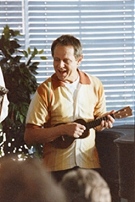
In Stanley's Gig
|
William: Well, the
best role I've ever had in my life is an independant film is called
"Stanley's Gig". They have a webpage, you can read about it.
Faye Dunaway plays my girlfriend. We know
that they have some offers. It's in the festivals now. It won at a
festival in Florida, the Audiance Award. The one I'm working on, it's
very low-budget. It's called "Monkey Love". I did a western,
which at this point, I think is called "Stage Ghosts" with a
director named Steven Furst. We have one on video now called "Nice
Guys Sleep Alone" and that'll go to cable. I just did one called
"Resurrection Boulevard" for Showtime.
EDITOR'S NOTE: Bill also appears in the new Blade Runner documentary produced by BBC 4.
Aaron: With much of your career still
ahead of you and so much great work behind you . . .
William: Well, I'm
almost the same age as Brion James, so I hope your right.
Aaron: Well, I think you'll be around
for a while.
William: Well, thank
you. We've had a lot of actors pass away. But I hope I stay healthy.
Aaron: Has there ever been a moment
that you wished you had just continued in law, and not acting?
William: Oh, yeah.
When I was arrested. (both laugh) (Mr. Sanderson later explained that he
had been a bit of a troublemaker in his teenage years which resulted in
a few misdemeanor charges.) And the serious answer is when you see
injustices and you can't do anything about it. But do I seriously regret
not taking the Bar and studying hard and gathering facts? Law is really
hard. I'm kinda lazy. But I'll just keep plodding along and see if we
can get another hit and you'll still talk to me in ten years or so.
Aaron: Mister Sanderson, we at
BladeZone want to thank you for taking time out of your schedule to chat
with us.
William: Well, thank
you.



